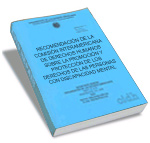- English
- Español
Rapporteurship on the Rights of Persons with Disabilities
The Inter-American Commission on Human Rights (IACHR) has addressed the situation of special vulnerability in which people with disabilities find themselves in the Americas through its system of petitions and cases, precautionary measures, general hearings, and country reports. The Commission has warned about the multiple challenges faced by people with disabilities in the recognition and guarantee of their rights, especially in the exercise of their legal capacity; access to justice; independent ways of life; access to health, social security, habilitation, and rehabilitation reasonable accommodation; inclusive education; access and permanence in work; accessibility and universal design; sexual and reproductive rights; participation and representativeness; violence and discrimination.
In the 2017-2021 Strategic Plan, the IACHR identified the situation of human rights of persons with disabilities as one of its priority issues for that period. As a consequence, a Unit on the subject was created in March 2017, which in February 2019 became the Thematic Rapporteur on the Rights of Persons with Disabilities. With the prioritization of the issue, the aim is to generate the necessary technical and institutional capacity so that people with disabilities can ensure their effective protection at the regional level, develop new mechanisms, as well as identify dynamics to advance in the construction of inter-American standards within the framework of the Inter-American Conventions.
The historical invisibility of the various problems that affect this population group is verified in most of the countries of the Americas. However, in the last two decades, this has begun to be reversed gradually from the normative level, after the adoption of the Inter-American Convention on the Elimination of All Forms of Discrimination against Persons with Disabilities, the first international human rights instrument specifically dedicated to persons with disabilities, and in the United Nations Universal System, the Convention on the Rights of Persons with Disabilities ("CRPD", 2006). The entry into force of these regulations signified a paradigm shift to the perception and recognition of people with disabilities, since the models of disregard and medical-rehabilitation are overcome, to adopt the social model of inclusion where the person with a disability is identified as a subject and actor of rights with full autonomy and human dignity.
The purpose of the Rapporteurship for Persons with Disabilities is to make visible the human rights challenges and violations faced by persons with disabilities in the Americas, to ensure the effective promotion and protection of their human rights through the various mechanisms of the Inter-American System and identify synergies and new opportunities that allow progress in the construction of robust inter-American standards, as well as promote laws, policies and practices that guarantee the effective enjoyment of the human rights of persons with disabilities under equal conditions.





